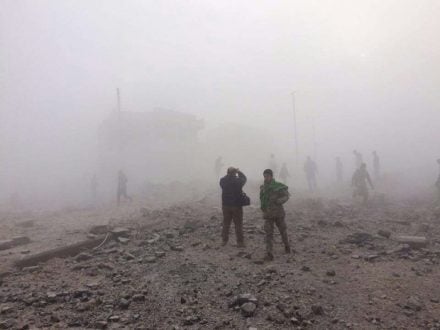Syrian civilians fear ceasefire will end after heavy bombardment of rebel areas
Civilians and activists fear the peace created by a ceasefire brokered by Russia and Turkey will not last the week as numerous locations across Syria continued to be hit by air strikes from forces loyal to the Assad government in the early hours of the New Year.
The latest warning came as the town of al-Atareb in the west Aleppo countryside was hit early Sunday by a suspected bunker buster bomb that caused huge damage to infrastructure in the rebel-held town.
Images from al-Atareb showed large plumes of dust from the rubble of buildings targeted by the air strikes, with craters preventing key supply routes from delivering aid and supplies to the town.
No casualties were reported, but local activists suspect the area was struck by Russian jets.
Activists from the Damascus suburb of Wadi Barada, who wished to remain anonymous, told Middle East Eye that the situation was calm, with no reports of artillery fire or rockets targeting their rebel-held enclave. Limited clashes that had continued in some parts of Syria on Saturday reportedly had included some around Wadi Barada and the southern city of Daraa, where one opposition fighter was killed.
Following the fall of Aleppo, prominent media activists from Wadi Barada issued a call demanding the world refocus its attention on the people of the Damascene suburb, which had faced weeks of heavy artillery fire from pro-Assad troops and sundry Shia militias.
On Saturday morning, Syrian opposition figures issued an ultimatum to the Syrian government to stop all hostilities against Wadi Barada at 8pm or “face a full resumption of hostilities,” according to a statement released on social media by various rebel groups.
The fighting in Wadi Barada has led to water shortages that have affected four million people in the capital.
Five rebel fighters and two civilians were killed in Wadi Barada and the rebel bastion of Eastern Ghouta near Damascus since the truce started on Friday, according to Syrian Observatory for Human Rights director Rami Abdel Rahman.
Meanwhile, a UN resolution that supported efforts to “jumpstart” talks aimed at ending the six-year conflict, as well as the ceasefire brokered by Russia and Turkey, was voted through unanimously by the UN Security Council on Saturday.
The Security Council resolution aims to pave the way for talks next month in Astana, the capital of Kazakhstan, under the aegis of Russia and Iran, both Syrian government supporters, and of pro-opposition Turkey.
Turkey and Russia say the Astana talks will supplement, not replace, UN-backed peace efforts, including talks set to resume 8 February in Geneva.
The text of the UN measure “welcomes and supports the efforts by Russia and Turkey to end violence in Syria and jumpstart a political process” and it calls the Astana talks “an important step” ahead of the upcoming Geneva negotiations.
It also calls for the “rapid, safe and unhindered” delivery of humanitarian aid to Syria.
Several council members had demanded clarifications over the reach of the resolution, what it would mean for the UN talks, how it might affect rebels recently ousted from Aleppo, and what it would mean for humanitarian aid.
The Syrian Observatory for Human Rights, a UK-based monitor of the war, said Saturday that most of Syria remained calm, despite limited clashes.
The government of Syrian President Bashar al-Assad called the ceasefire a “real opportunity” to find a political solution to a war that has claimed more than 310,000 lives and displaced millions since it began in March 2011 with protests against Assad’s regime.
Source: Syrian civilians fear ceasefire will end after heavy bombardment of rebel areas | Middle East Eye

